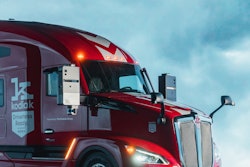Trucking news and briefs for Tuesday, Jan. 16, 2024:
Indiana looks to ban driverless trucks
Nearly identical bills introduced in both the state senate and state house in Indiana would effectively ban the use of driverless autonomous trucks in the state.
The bills would require a human operator to be physically present in any autonomous commercial motor vehicle.
Indiana state Sen. Jim Tomes, one of the authors of the Senate bill, said the bill would increase safety on state highways.
"With new technology on the horizon and more self-driving vehicles being used on our roadways, it is important our laws reflect these changes to keep Hoosiers safe," Tomes said. "Driverless vehicles, especially large trucks, could pose a danger on our public roads if not monitored properly.”
New York also recently introduced similar legislation. The Autonomous Vehicle Industry Association voiced its opposition to New York’s bill, with AVIA CEO Jeff Farrah saying it would “impose a premature and permanent ban on autonomous trucks.” The Teamsters union has largely been in favor of similar bills.
California last year passed a similar bill, but it was vetoed by Gov. Gavin Newsom.
[Related: New York driverless truck ban proposed in senate]
Texas gets $70M to build hydrogen fueling stations
The Biden-Harris Administration last week announced $623 million in grants to help build out an electric vehicle (EV) charging network across the U.S.
As part of that funding, the the North Central Texas Council of Governments will receive $70 million to build up to five hydrogen fueling stations for medium- and heavy-duty trucks in Dallas-Fort Worth, Houston, Austin and San Antonio. The project will help create a hydrogen corridor from southern California to Texas, the Federal Highway Administration said in a press release.
The grants eere made possible by the Bipartisan Infrastructure Law’s $2.5 billion Charging and Fueling Infrastructure (CFI) Discretionary Grant Program, a competitive funding program, and will fund 47 EV charging and alternative-fueling infrastructure projects in 22 states and Puerto Rico, including construction of approximately 7,500 EV charging ports.
The city of Blythe, California, will also receive $19.6 million for a WattEV truck charging terminal.
TEL donates truck to mobile medical clinic
 Transport Enterprise Leasing's David Bellner (left) hands over the keys of a 2022 Freightliner Cascadia to Chris Hall (center) and John Volpe of Remote Area Medical.Transport Enterprise Leasing
Transport Enterprise Leasing's David Bellner (left) hands over the keys of a 2022 Freightliner Cascadia to Chris Hall (center) and John Volpe of Remote Area Medical.Transport Enterprise Leasing
Transport Enterprise Leasing (TEL) has donated a 2022 Freightliner Cascadia to Remote Area Medical (RAM) to power the nonprofit’s free pop-up clinics, announced Victor Duggard, chief financial officer of TEL.
The truck, valued at $85,000, will transport RAM’s mobile clinic to locations throughout the region where the charity provides medical, dental and vision care to the uninsured and underserved.
“There is a tremendous need for medical services for individuals without insurance or the money to get medical services in our society. This is where RAM fills the void,” said TEL CFO Victor Duggard. “Partnering with a great organization like this is a great way for us to give back in our community.”
Dozens of clinics are scheduled for the coming months in Tennessee, North Carolina, South Carolina, and in states as far away as Alaska.
“RAM is grateful for this generous donation from Transport Enterprise Leasing,” said Chris Hall, chief operations officer. “This commercial truck will allow us to continue to provide free, quality healthcare to those in need across the United States. As we expand our services and number of clinics, our fleet of tractor-trailers becomes an ever-growing, important aspect of delivering the care that countless individuals are seeking. Barriers exist for our patients in many different ways. With this truck, we are able to continue to remove those barriers that stand in the way of access to healthcare.”












